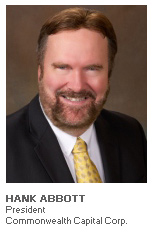
From its beginnings as Commonwealth Computer Corp. in the late 1970s and throughout its history, Commonwealth Capital Corp. has been guided by the principles of hard work and ingenuity set forth by its founder George S. Springsteen. Kimberly Springsteen-Abbott, Springsteen’s widow and his successor as CEO of Commonwealth Capital, has described its founder in the company's early days as a “one-man show and one-man company.” Much like the equipment leasing industry itself, the company has evolved and changed with the passage of time.
To wit, Commonwealth Capital’s first fund was launched as a $1.5 million private placement offering sold to high net-worth individuals following the advent of the 1986 Tax Reform Act. Some 36 years later since it's inception, Commonwealth has priced, structured and negotiated lease transactions in excess of $1 billion for several Fortune 1000 companies.

As a result of Commonwealth Capital’s remarkable growth, its adherance to its guiding principles and its stature within the industry, Equipment Finance Advisor spent time with Hank Abbott, Commonwealth’s president. Abbott, who joined the company in 1998 as a portfolio manager, discusses the opportunities that his firm is able to leverage in today’s economic environment. In the following interview, Abbott speaks to topics ranging from the funding and regulatory advantages that equipment leasing income funds enjoy to the various ways the market has evolved for these funds since the latest recession. Abbott also the shares the unique ways Commonwealth has positioned itself as a corporation to compete effectively within the equipment leasing and finance industry.
Equipment Finance Advisor: Hank, what are the advantages of using investor funds as a source of capital? Are there regulatory advantages, advantages with regard to your cost of capital or something else not mentioned?
Hank Abbott: The primary advantage is that we can make our investment decisions based on our fund parameters, not lender requirements. This allows us to focus on lease transactions that meet our investment criteria, as defined in our Prospectus for public funds or Private Placement Memorandum for our Reg D offerings. As to the cost of capital, it’s definitely higher for us, but not so much higher that we can’t offer competitive lease rates.
Equipment Finance Advisor: How do you compete against other players such as bank-owned leasing companies that can access capital at a very low cost of funds?
Abbott: In 2006 when our founder, George Springsteen passed away, Kim Springsteen-Abbott became our sole shareholder. Kim had the vision to take our business to new heights. In 2008, we applied for certification as a women owned diversity supplier with the Women’s Business Enterprise National Council (WBENC). Kim has become quite active in the WBENC, recently serving as a member of the host committee for the 2014 National Convention and Business Fair in Philadelphia. That certification enables us to provide Tier 1 diversity to our lessees. This gives us the ability to compete with much larger players who may have superior resources. It doesn’t level the playing field by any means, but it does give us an opportunity to compete. As a direct result of this certification, we have gone from being a purchaser of lease paper to a direct origination model. Today we directly originate over 90% of our annual lease volume.
Equipment Finance Advisor: How has the market changed post-recession for a niche player such as Commonwealth Capital?
Abbott: The market has changed in many ways, but the key to survival for us was being a consistent source of capital in an uncertain market. The second key was to establish and maintain a high level of service for our lessees. We get many compliments on our contracts team, our lease relations people, and our A/R group. We make sure that vendors get paid promptly. We opened our own dedicated return facility to provide timely and accurate audits. That fosters relationships that last and leads to repeat business. As a result our leasing business has grown post-recession and we believe that we have built a sustainable model for the future.
Equipment Finance Advisor: What is your posture with regard to residual rates in comparison to a bank’s in providing FMV deals? Can you take higher residuals since you aren’t regulated in the same way? How does this impact your competitiveness?
Abbott: While we are not regulated in the same way as a bank, we are responsible to our investors and to the business model spelled out in our offerings. It’s fair to say that we have a conservative model, not only with regard to residual positions, but quality lessees, credit standards, equipment type, diversification requirements and more. When we have an opportunity to bid that we like, we compete effectively, but we will never consistently be the most aggressive bidder. We pick our spots. Our annual requirements for lease volume are very small compared to a bank’s and we can afford to be more selective in the leases we choose to go after.
Equipment Finance Advisor: In closing, is there anything more you would like our readers to know?
Abbott: We’ve been in business for 36 years now. Our founder, George, started out as a one-man leasing company and today we have close to 60 employees. The only constant in the leasing industry, like life, is change and we’ve all had to stay on our toes and constantly adjust in order to survive. I’ve spent my life in the leasing industry and I’ve thoroughly enjoyed our business, its many challenges and rewards. It’s been a great ride for me over the last 16 years at Commonwealth and I look forward to a bright future.